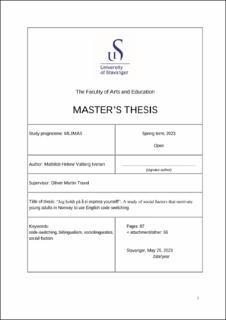| dc.description.abstract | This thesis is a study of the social factors that influence young adults in Norway to code-switch between the Norwegian language and the English language. The study uses both qualitative and quantitative approaches, with qualitative interviews as the main data collection method. The purpose of the interviews was to gather insights and perspectives from the young adults themselves through a sociolinguistic lens. The study includes 10 informants aged 20-25, divided into two groups based on their educational backgrounds. The theoretical framework draws upon the works of Le Page and Tabouret-Keller (1985), Myers-Scotton (1993), and Gardner-Chloros (2009), among others. Concisely addressing the research question: What social factors motivate young adults in Norway to engage in English code-switching? is challenging due to the complex and multifaceted nature of the motivations behind code-switching among young adults in Norway. Several social factors, some of which are interdependent, may contribute to this phenomenon: The prevalence of social media and other online platforms has facilitated the subconscious acquisition of the English language, making it readily available to the informants. The informants may find the English language consumed through social media and other online platforms more relatable compared to the English taught in schools, which in turn may lead to the incorporation of the English language into their own lives through code-switching. However, the context must also allow for code-switching. Factors such as age group, informality among the interlocutors, and the nature of the conversation, play a role in determining whether the informants choose to engage in code-switching or not. For instance, the informants tend to avoid code-switching in formal and professional contexts. Despite the similarities in their responses, a notable distinction was found in their attitudes towards observing other people using code-switching in an otherwise Norwegian conversation. Both groups did however express criticism towards the use of excessive code-switching, suggesting that a balance needs to be struck between using it appropriately, and using it too much. | |
